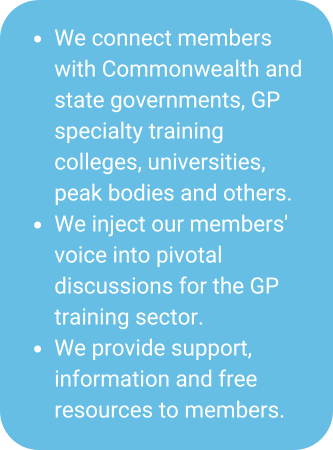
About us
Advocating to make a difference
At GPSA, we take our role as member advocate very seriously.
Recognizing our members’ crucial role in shaping the future general practice workforce, our stakeholder engagement extends beyond the Australian vocational training sector.
We sit on a growing number of steering groups and advisory committees and meet regularly with sector stakeholders such as GPRA, RACGP, ACRRM, Commonwealth Government and also:
- Australian Indigenous Doctors’ Association (AIDA)
- Remote Vocational Training Scheme (RVTS)
- Australian Medical Association (AMA)
- Australian Association of Practice Management (AAPM)
- Medical Deans Australia and New Zealand (MDANZ)
- Universities and rural training hubs
- Jurisdictional Single Employer Model (SEM) teams
- Rural Doctors Association of Australia (RDAA)
- Postgraduate medical councils
- Rural workforce agencies
- State-funded rural generalist pathways
- National Rural Health Commissioner
- Workforce Planning and Prioritsation Organisations
Advocacy priorities
Through our expanded sector stakeholder engagement, GPSA now has a seat at most of the tables where decisions impacting our members are made.
We use these sector fora to promote the issues our members have shared with us as priorities, such as:
PLACEMENT PROCESSES
- placement processes (AGPT) should be developed around the needs of registrars and practices rather than the needs of the well-funded training provider – no more than one process per year, ideally for 12-month placements but otherwise for 2 x 6-month placements
- challenging the need for 6-month fixed term placements that limit the employment relationship between practice and registrar
- challenging the need for a 6-monthly recruitment process that imposes hardship for practices and registrars, and makes business planning problematic
- longer placements essential for practices to recoup costs and therefore offer more flexibility in employment arrangements
- longer / more flexible employment / training contracts and MPN arrangements needed so that practices can assist registrars taking unpaid parental leave to retain skills currency and bond with supervision team (assumes the registrar commits to returning to the same training site left at the point of commencing parental leave, which would need to be accommodated by a more flexible training provider approach to placements)
SUSTAINABILITY OF THE SUPERVISION WORKFORCE
- challenging continuing sector expectations that supervisors should be supervising the future GP/RG workforce with no remuneration, and only receiving financial compensation for the small number of hours attributed to dedicated teaching time
- supervisors required to do more and more for less and less – current funding prioritisation of formal education undermining the value of in-practice training and whole-of-practice supervision
- without adequate remuneration of non-owner supervisors (medical students through to vocational trainees), the shrinking pool of owner-supervisors is reducing registrar access to quality training practices
SUSTAINABILITY OF TRAINING IN COMMUNITY PRACTICES
- practice-registrar relationship needs to be prioritised as central rather than ancillary to the quality of training outcomes
- limitations to practice viability and employment flexibility imposed by training program / MPNs / placement policies / funding models across educational continuum
- need to tackle varying degrees of powerlessness and frustration members have expressed over the increasing training program impact on
- patient access
- supervisor availability and workload
- administrative burden
LACK OF PREPARATION OF INCOMING REGISTRARS
- failure of training providers to ensure that new registrars are familiar with the “basics” from the commencement of employment so that their time in the training practice can be maximised on developing consultation skills and ensuring registrar and patient safety in preparation for independent practice
- base level induction and introduction to key concepts needs to be done and certified by the training provider prior to the start of each placement, with training site visibility of content – allowing for resources allocated to local community induction to be utilised effectively without duplication of effort and time
INTEGRATION OF SUPERVISION ACROSS EDUCATIONAL CONTINUUM
- collaboration across universities, postgraduate medical councils and Colleges needed to
- minimise duplication of accreditation and supervisor PD requirements
- provide greater recognition of the important role supervisors and training practices play in fostering a passin for general practice
- provide sufficient financial and professional support for GP supervisors to make this role a destination in its own right for the medical students and junior doctors they play a part in shaping as future GPs/RGs
- see the GPSA discussion paper on this topic here
Connecting the dots - sector conduit
As the peak organisation for General Practice (GP) and Rural Generalist (RG) training across Australia, General Practice Supervision Australia (GPSA) acts as a sector conduit – connecting our members with Commonwealth and state governments, the GP specialty training Colleges, universities, affiliated peaks like General Practice Registrars Australia (GPRA), and other sector stakeholders.
Building ties with the university and prevocational sectors
GPSA has broadened its traditional focus on vocational training to better support supervisors and practice teams involved in supervising medical students and prevocational learners. This shift has resulted in significant wins for our members and the broader sector, ushering in a more inclusive era for GP pathways.
Securing agreement from both Colleges: the SLO Advisory Council
In light of the changes to the GP training environment in the transfer of training from the 9 RTOs to the 2 GP specialty Colleges, GPSA has played a pivotal role in securing a future network for the nation’s Supervisor Liaison Officers. This has involved the development and execution of a Memorandum of Understanding (MOU) tied to newly created Terms of Reference (TOR) for the SLO Advisory Council.
Date reviewed: 25 June 2025


